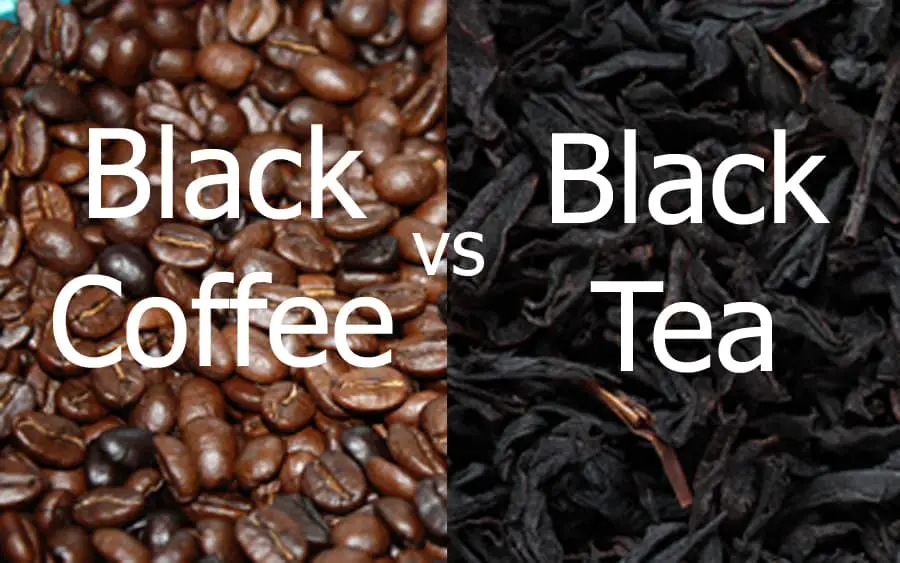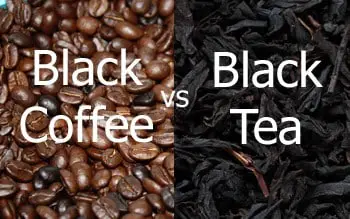When it comes to choosing, I always choose black tea over coffee. While my choice is based solely on preference in taste, and my tea experience, people do ask which one is better; black tea vs black coffee?
For a coffee person, mornings don’t usually start without the much-needed caffeine kick from coffee and, of course, there is no better way to start the day. Black tea lovers, however, might disagree. Here’s the rundown on black tea vs black coffee…
Studies show comparable benefits between black tea and black coffee. Although the health benefits of tea generally outweigh coffee. That includes black tea and black coffee. Black coffee offers a greater caffeine hit, and black tea has less caffeine for those lowering their caffeine intake.
According to proponents of black tea, with its lesser caffeine content and health-boosting properties, black tea is a much healthier and safer way to start the day. Advocates of coffee, on the other hand, would beg to differ. “Nothing wakes you up like coffee” is what every coffee lover says. Well…
Black Tea vs Black Coffee
While the war on black tea vs. coffee is majorly based on personal preferences, one can’t help but wonder who wins in the black coffee vs. black tea debate.

Read on to find out how these two caffeinated drinks are so different yet so similar. And which one is scientifically proven to be better for you.
Brewing methods
When it comes to brewing methods, you will find there are many different ways to brew coffee; espresso, French press, cold brew, and coffee maker to name a few.
Each brewing method yields a completely different flavor. For black tea, on the other hand, aside from regular store-bought tea bags, there is only one true way to brew it- steeping. The longer your black tea is steeped, the stronger and richer the flavor becomes.
The main reason for this difference in the brewing method is the difference in the composition of plant matter.
The roasted and ground coffee beans are more water soluble than the dried tea leaves. This is why you can easily extract the flavor of coffee beans by simply pouring hot water on them, but for tea leaves to release their flavor you need to allow it a decent amount of steeping time.
For brewing tea, I’ve selected the best equipment I can find. So if you’re looking for a gift or a special item to get into tea, then be sure to check my tea-wares pages here.
Now we’ll move on to the benefits, and here’s a quick summary table to help get a quick view…
| Benefit | Black Tea | Black Coffee |
|---|---|---|
| Greater Antioxidants | High | Medium |
| Cardiovascular benefits | High | Medium |
| Improves Digestive system | Medium | High |
| Aids Weight loss | High | High |
| Promotes longevity | High | High |
| Mood Booster | Medium | High |
| Helps oral health | Medium | Medium |
| Helps prevent diabetes | High | High |
| Promotes bone health | High | Medium |
Here’s how many cups of tea you should be drinking each day – of each variety.
Black tea vs black coffee: Health benefits
Both black tea and coffee have their own individual pros and cons. However, when it comes to the question “which one is healthier?” the final verdict can only be given after a thorough investigation of the health properties of each. I must also add that, at the end of the day, it is all (mostly) about one’s personal preference…. of course!
Presence of antioxidants
Black tea proponents would rejoice to know that their cup of black tea is brimming with immune-boosting antioxidants that provide protection against a number of diseases.
Antioxidants are powerful compounds that provide protection from cellular damage. They do so by fighting free radicals – harmful compounds responsible for cellular damage and chronic disease.
According to one research, black tea contains eight to 10 times more polyphenols than found in fruits and vegetables.
The antioxidants found in black tea also give the immune system a boost and fight inflammation. According to Harvard Health Publications, these antioxidants are effective in providing protection against several different types of cancers.
Not only that, but compounds found in black tea provide protection against bacterial infection and viruses by increasing the production of white cells.
Coffee is also a rich source of antioxidants, especially polyphenols and hydrocinnamic acids.
These antioxidants help prevent oxidative stress on cells which have been linked to a number of diseases including cancer. Coffee also contains high amounts of the antioxidant, flavonoid.
Flavonoids, by reducing oxidation of LDL “bad” cholesterol, help protect against cardiovascular diseases. According to studies, the antioxidants in coffee also provide protection against Alzheimer’s, dementia, and other chronic diseases.
With respect to the antioxidant properties of both black tea and coffee, none can be said to be better than the other. Both of these have ample amounts of antioxidants; hence it’s advisable to consume both of them to get the different varieties of antioxidants.
Summary
Both Black Tea, and Black Coffee contain ample amount of antioxidants
Tea and Coffee impact on cardiovascular health
According to a study, people who consume up to three cups of black tea daily showed a reduction in the risk of having a stroke. Black tea is rich in flavonoids; antioxidants essential for keeping the heart health in good shape.
Flavonoids are disease-fighting, anti-inflammatory antioxidants that protect your heart against cardiovascular diseases.
They do so by reducing blood clots and protecting the vessels and arteries of the heart from inflammation and hardening.
According to Dutch research, people who consumed more than six cups of black tea daily had a 36 percent lower risk of heart disease in comparison to those who had one cup or less of tea per day.
Surprisingly, coffee has also been linked to reduced risk of cardiovascular disease. Statistics show that people who consume up to four cups of coffee showed a 20 percent reduction in the risk of heart disease in comparison to coffee drinkers consuming less than two, or more than four cups.
Coffee consumption
Too much coffee consumption however can lead to the accumulation of caffeine in your body and have a negative effect on your heart.
Excessive caffeine causes blood pressure to rise and increases the heart rate, so if you happen to have high blood pressure, stick to two cups of coffee per day or less.
The impact coffee and black tea have on cardiovascular health clearly show that black tea is the clear winner here.
Black tea not only protects you from cardiovascular diseases but is also effective in keeping your heart in good shape.
So don’t be afraid to get another cup of black tea for yourself. And I’m seriously removing any possible bias here on my part! 😉
You might also want to know the caffeine levels in herbal tea, Ceylon tea, or Earl Grey.
See also, Black tea vs Earl Grey, and the 20 best teas to drink in the morning!

Tea and coffee affects on the digestive system
Coffee has for long been associated with irritable bowel syndrome. However, recent research proves otherwise.
According to researchers at the University of Southern California (USC) Norris Comprehensive Cancer Center of Keck Medicine of, a reduction in colorectal cancer has been shown in people who drink coffee.
The research revealed that coffee consumption was directly proportional to a reduction in the risk of colorectal cancer. That is, the more coffee consumed, the lesser the risk.
Coffee consumption has also been linked to a reduction in gallstones and liver cirrhosis. Furthermore, coffee has been shown to stimulate bowel activity and provide protection against colon and rectal cancers.
Black tea though, is touted for its metabolism boosting properties. Black tea has been shown to improve gut health and contribute to weight loss by altering your gut microbiome.
One study, published in Food Reviews International, found that black tea fights bad bacteria in the gut and helps the production of healthy bacteria.
When it comes to the question of which one is better for the digestive system, coffee just about edges it over tea son this point… see … no bias at all, just the facts!
Speaking of Facts
Discover 100 Amazing Facts About Tea
Tea and coffee effect on weight loss
We all are looking for one way or another to shed a few pounds, aren’t we? Well, look no further …since black tea has been proven to be quite effective for weight loss.
New research indicates that black tea is in fact, effective for weight loss. A study, published in the European Journal of Nutrition, revealed that black tea aids help with weight loss with help of a specific mechanism through the gut microbiome. Black tea helps flourish healthy gut bacteria and kill obesity-causing bacteria, thereby contributing to weight loss.
What’s more, black tea is rich in flavonoids that help lower triglyceride levels and fight obesity-causing inflammation. Also, unsweetened black tea has almost negligible calories so you don’t need to feel guilty about that third cup of black tea.
While coffee, on the other hand, does show weight loss properties, you can only reap its benefits if you take it sans sugar.
The hero ingredient in coffee, with respect to weight loss, is caffeine. Caffeine works its magic by stimulating the nervous system to signal fat cells to break down fat by increasing the hormone epinephrine in the blood.
Epinephrine helps fat breakdown by signaling the fat cells to start breaking down fat. According to studies, coffee helps aid weight loss by thermo-genesis; a process that burns calories by generating body heat. The caffeine in coffee also aids weight loss by increasing the metabolic rate and suppressing appetite.
There’s a but
But …it must be kept in mind that coffee can only help you lose weight if your calorie consumption is less than the number of calories you are burning. I guess the same applies to most diets!
We can conclude that, in light of the above discussion, black tea appears to have the edge over black coffee for weight loss. But the result is minor, I’d say they’re both good.
As you can probably experience the same, or similar weight-loss benefits from black coffee… the decision is up to you.

Tea and coffee effect on longevity
Coffee lovers have one more reason to enjoy their cup of Joe; Studies have shown coffee to help increase longevity.
According to a study at Harvard, coffee consumption has been linked to a reduction in premature death. Researchers at Harvard found that people who consumed three to five cups of coffee daily had a reduced risk of dying prematurely from heart disease, neurological disease, and suicide. What’s not to like?
Coffee is also packed with powerful, disease-fighting antioxidants. These antioxidants have been found to be chemo-preventative and have been shown to provide protection against certain types of cancer.
The mail online reported that consuming Six cups of coffee on a daily basis has been found to decrease the risk of premature death by 16%.
Black tea drinkers, also, have been shown to live longer; surely a reason for black tea lovers to rejoice…
The antioxidants found in black tea have shown to boost heart health, provide protection against cancer, maintain brain health, and stabilize blood sugar levels.
Study
A study, published in the Journal of the American Medical Association, revealed that the antioxidants found in black tea, reduce the risk of death due to cardiovascular diseases.
According to an Australian study, published in The Journal of Clinical Nutrition, women, in their 70s and 80s, who had two cups of black tea daily, had a better life expectancy than those who didn’t. This result has been accredited to a change in genetic code brought about by black tea compounds.
So this could be considered a ‘draw’ then. With respect to the side effects excessive caffeine consumption can impose, it can largely be said that black tea is better for increasing life expectancy and longevity. While coffee is preventative with respect to premature death.
Perhaps this is a good time to look at my
Best Five Starter Teas for Beginners.
Mood booster and stimulant
Most of us need some form of boost first thing in the morning to kick start our day. Both, black tea and coffee are ideal pick-me-ups, thanks to their caffeine content. However, it can’t be denied that coffee wins the game when it comes to mood-boosting and jolting our nerves back to alertness.
As most coffee lovers will know, you can pretty much improve a negative mood with 300 milligrams of caffeine per day i.e. two large cups of coffee.
Caffeine stimulates your nervous system, leading to increased alertness, better mood, and improved performance.
Black tea, on the other hand, helps boost mood and produce a feeling of well-being. The amino acid L-theanine found in black tea is responsible for increasing concentration, improving memory, and mood-boosting properties.
But, when it comes to caffeine content, coffee is yet again the clear winner here – but then you knew that… right?
A cup of black tea has almost half the amount of caffeine (40 milligrams) in comparison to a cup of coffee which has a caffeine content of 80 to 115 milligrams.
So, if you need something to beat the mid-day slump black tea is an ideal choice. However, if you need to wake up your senses and boost your energy, then coffee is for the win.
Effect on oral health
Coffee and black tea are both rich in polyphenols that are effective against plaque. Black tea contains fluorides that protect and fight against cavities and keep your dental health in good shape, a study revealed.
A cup of black tea is packed with 0.2-0.5 mg of cavity-fighting fluoride that prevents the formation of plaque-causing bacteria.
A study by the academy of general dentistry found out that black tea results in less enamel loss as it doesn’t have an erosive effect on teeth. Moreover, a team from the University Of Illinois College Of Dentistry found out that compounds in black tea provide protection against plaque by fighting against plaque-causing bacteria and preventing bacterial growth.
Coffee is a powerhouse of polyphenols that play their part in oral health. The anti-inflammatory compounds in coffee are effective against periodontal diseases.
A study, on the link between coffee consumption and oral cancer, showed that coffee does provide protection against oral cancers. Studies show a 37% reduction in risk of oral cancer in people who consume a fairly good amount of coffee than those who drink little or no coffee.
There is, however, one disadvantage; both black tea and coffee can cause teeth to stain. Black tea and coffee contain tannins. Tannins are compounds responsible for breaking down the enamel layer on teeth.
Coffee and black tea pigments then attach to teeth, leading to a yellowish stain so, maintaining good dental hygiene is a must. I gave both black tea and black coffee a “medium” in my table above, simply because of this downside!

Diabetes prevention
When it comes to diabetes, both tea lovers and coffee lovers can rejoice. Studies show tea and coffee, both, to be effective in reducing the risk of diabetes.
According to a study published in the “Journal of Food Science” black tea contains polysaccharides, compounds that slow blood sugar absorption, that help reduce the risk for diabetes.
While another study revealed that people who consume one to two cups of black tea daily have a 70% lower risk of developing type-2 diabetes. Polyphenols, antioxidants, found in black tea increase insulin activity and help keep the blood sugar levels stable.
Similarly, coffee has also been shown to reduce the risk of diabetes. A study published by the Harvard school of public health revealed that people who increased their coffee consumption by up to one cup or more showed an 11 percent reduction in the risk of developing diabetes. Whereas, a 17 percent increased risk of diabetes was found in people who decreased their coffee consumption.
Impact on bone health
When it comes to bone health, research indicates higher bone density and reduced rate of bone loss in people who consume black tea on a daily basis. A study revealed that black tea may, in fact, be effective in protecting women from osteoporosis due to its bone-strengthening properties.
Also, two European studies revealed that women who consumed black tea had a lesser risk of hip breaks and fractures. Coffee, on the other hand, doesn’t show any connection with increased bone strength. However, coffee may be conducive in maintaining the strength of the existing muscles.
According to a report by the Society for Experimental Biology, caffeine maintains the strength and improves the power of older muscles.
All in all, both black tea and coffee have a positive impact on bone health. Though, black tea clearly wins out on this point.
Your Bones Deserve a New Teapot!
You’ll find your next perfect Teapot or Tea Set on my Tea-wares Page!
Black tea vs black coffee: Common side effects
Now we’ll look at the side effects, and again I’ve added a quick reference table for you…
| Side Effect | Black Tea | Black Coffee |
|---|---|---|
| Effects from caffeine | Medium | High |
| Increases cholesterol | Low | High |
| Impact on Iron absorption | High | Medium |
| Gastrointestinal discomfort | Medium | High |
The common culprit: Caffeine
When it comes to side effects for black tea and coffee, we have a common culprit; caffeine.
The caffeine content for each of the beverages is responsible for the side effects each pose. Excessive caffeine consumption causes the heart rate to rise, which can lead to increased blood pressure. So if you have a high blood pressure definitely limit your caffeine intake.
People with a genetic mutation that causes caffeine to break down slowly in the body should stick to one cup of coffee per day as any more of it can increase their risk of heart disease.
The caffeine content in black tea is relatively moderate (42mg to 79mg per 8 ounces) compared to coffee with around 72 mg to 130 mg per 8 ounces.
While caffeine in black tea does provide a quick pick-me-up, excessive black tea consumption can lead to caffeine toxicity by reducing serum potassium to abnormally low levels.
Excessive caffeine can also lead to dehydration resulting in irritability, reduced focus, and headaches.
The caffeine in both black tea and coffee, if taken in large quantities, can affect the nervous system, increase hyperactivity, increase blood pressure, and cause gastric issues.
o the key here is to keep things in moderation. According to USDA daily caffeine consumption should exceed no more than 400 milligrams of caffeine per day.
Impact on cholesterol
Cholesterol patients beware; coffee has been shown to increase cholesterol. How you prepare your coffee also has an impact on its health value.
Espresso or French press is unfiltered coffee. Studies have linked excessive consumption of unfiltered coffee to increased levels of bad “LDL” cholesterol, which may lead to an increased risk of heart attack and stroke.
Oily substances in unfiltered coffee, cafestol and kahweol (called diterpenes) are responsible for increasing LDL cholesterol. They do so by tampering with the body’s ability to break down cholesterol and stabilize blood cholesterol levels.
According to a study, published in Arteriosclerosis and Thrombosis, people who consume unfiltered coffee have been shown to have higher levels of LDL cholesterol compared to those who don’t.
Reduced iron absorption
Studies have shown that black tea and coffee can lead to a reduction in iron absorption in the body. Surprisingly though, black tea leads to a greater reduction in iron absorption than coffee.
This is due to greater concentration of tannins, polyphenols, in tea that inhibits iron absorption.
According to one study, having a hamburger with a cup of coffee reduced absorption of iron by 39 percent. Having a hamburger with a cup of tea, on the other hand, lead to a massive reduction in iron absorption by 64 percent.
It’s important to note here that it is not caffeine that is the culprit here, tannins found in coffee and black tea is to blame.
Tannins decrease the bioavailability of iron by binding with it during digestion and inhibiting iron absorption.
Also, it’s important to know that the impact coffee and black tea have on iron absorption is also related to when you have your drink. For instance, taking your meal after an hour of drinking a caffeinated beverage showed no effect on iron absorption.
Increased gastrointestinal discomfort
You may be unaware that your cup of Joe may be worsening your GERD (gastroesophageal reflux disease).
While both coffee and black tea are acidic, coffee is found to be more acidic than black tea. Acidity is determined by PH levels. According to an analysis, Black tea has a pH of 6.37, while coffee had a pH of 5.35. The acidity of coffee is a major cause of concern for GERD patients; Caffeine has been shown to trigger heartburn and gastrointestinal discomfort.
A general rule of thumb is that the more caffeine it contains, the more acidic it is going to be. So switching to cold-brewed coffee may be more beneficial as it has a lesser amount of caffeine and, therefore, is less acidic.

Black tea vs black coffee: history and origin
While both black tea and black coffee have been around for quite some time, tea is the older beverage of the two.
It was a Chinese emperor, Shen Nung, who first introduced the world to tea n 2737 BC. Legend has it that one day emperor Shen Nung was sitting under the tree of Camellia sinensis when his servant brought him a bowl of boiled water.
A leaf from the tree blew into the bowl and changed the color and flavor of the water. Shen Nung, on tasting it, was enthralled by the flavor. And this is how tea came into being.
However… it wasn’t until the mid-17th century that black tea was accidentally discovered in the Wuyi Mountains in Fujian, China.
Tale has it that when a passing army took shelter at the tea factory of Fujian, farmers left the tea leaves out in the sun, having no time to process it. These leaves were then smoked over pine wood and resulted in black colored tea leaves, which the British referred to as “black tea”.
Since then black tea has gained worldwide popularity.

In fact, popularity has grown so much that it is now, after water, the second most consumed beverage in the world.
For coffee
Coffee was discovered much later during the 15th century and is a major part of Yemenite and Ethiopian culture.
A popular Ethiopian legend has it that an Abyssinian goat herder, Kaldi, found his goats behaving excitedly after eating a certain “red berries”. Kaldi took these red berries to the monastery, where the monks found it to be a stimulant that helps them stay awake.
It was then used in the monasteries to help monks stay awake during their spiritual practices. The practice of brewing coffee then popularized in the Islamic world during the 13th century and spread to Europe in the 17th century. Since then people consuming and enjoying coffee all over the world.
The final verdict
To be honest, both black tea and coffee have their own pros and cons. Both offer some benefits and it’s pretty hard to discern too much between the two.
However, black tea, as backed by science, is certainly much healthier for your ‘overall’ well-being.
The major downside with coffee (unfortunately) is its caffeine content, but …if coffee is your beverage of choice, then you can still get its benefits if you have it in moderation – and unsweetened.
Ah, well despite all my scientific speak and research, at the end of it all, it just comes down to personal taste and preference …and maybe just not letting science cramp your life choices quite as much as it could! It might surprise you to know I often drink coffee in the morning if I need a major kickstart!
